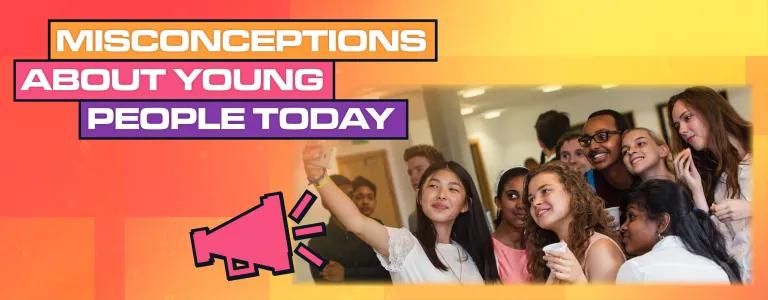
Misconceptions About Young People Today
Include this article in your Skills Builder Journal. It could help you develop... 

Every once in a while, someone will disturb the hibernation of an old debate and they’ll try to convince us that all generations hate each other. These ‘generation wars’ strive to pull us apart and negatively emphasise our differences. They suggest that each age group quietly (or not so quietly) believes they’re better than the others, but that’s not true. Most of the time, we work in relative harmony and enjoy learning from one another, but there’s always a few myths and misconceptions left in the residue. Here, I want to set the record straight on a couple of points and debunk a few theories about young people…
Technology
Some people assume that, having grown up with technology all around us, we know the tiny details about how everything works. As the youngest in my house, I’ve been appointed, against my will, the role of Tech Support. What my family doesn't realise is I’m vastly under qualified as I know very little about computers beyond my experience with phones and faint memories of Year 9 Computer Science. Even so, I’ve had to scramble through IT problems for parents and grandparents, ranging from “how do I take a photo?” to “can you set up my hotspot?” to “which laptop should I get: the one with a 1400:1 contrast ratio or the one with the oleophobic coating?”. While they sit back and enjoy the peace, I feel like I’m sitting a foreign language paper in an alien’s alphabet. General rules for technology: we’re not all addicted to it and no, we don’t know what every button does.

Sleep
There’s a popular idea that teenagers either spend their entire lives in bed or never sleep at all. It tries to split us into makeshift caterpillars building a bedsheet cocoon or restless squirrels on ridiculous amounts of coffee somehow managing to outrun the Sandman. Okay there may be some truth to the coffee part, but most young people average seven hours of sleep per night, just below the recommended eight to ten hours. This is partly because there are too many things going on in the day and it’s hard to squeeze them all in before a reasonable bedtime. More fundamentally, it’s because of biology. During puberty, our biological clocks shift so we naturally feel sleepy and then wake up about two hours later than usual. However, with early starts for school, college, or work, our sleep gets cut short which makes us perpetually tired. So if we’re a bit drowsy, blame science, not us.

Being Politically Correct
One of the biggest misconceptions about young people is our supposed obsession with being ‘politically correct’. While it’s true that there’s been a shift in recent years to calling out potentially harmful language and sentiments, lots of people have the wrong idea about why we think it’s so important. For many, the focus is not on being correct but being kind. For example, we don’t use a trans person’s proper pronouns simply to be right or to tick off another square on the social justice bingo card. We do it to make that person feel appreciated, comfortable and seen. It’s about social connections and building a global community based on love - something we should celebrate.

Impulsiveness
Sometimes we get a bad reputation for being impulsive and it’s technically right. With the freedom of being a young person rather than a child, we’re left to make more and more of our own decisions and it can be hard to choose the right option when the easy route looks much more appealing. Returning to science, we can see that our brains continue developing throughout our teenage years, so we’re effectively working with a brain-in-progress. One of the last things to mature is the prefrontal cortex, which is responsible for controlling impulses, problem solving and reasoning, among other functions. Without a fully realised logical thought processor, we often resort to our amygdala (the emotional regulator) to help us make decisions. Once again, it’s not our fault if we prefer short-term rewards over long-term gains, or if we can’t help being impulsive. It’s our brain’s fault.

If we look at putting the people in ‘young people’, it’s clear that we’re all individuals who, like adults, have a diverse range of thoughts, feelings and experiences. These tips don’t speak for everyone but hopefully they’ll encourage us to question our assumptions and the reasons behind a person’s behaviour. It’s amazing how different we are and these differences can be our strengths. In some situations we need an emotionally rich response to something. And sleeping at various times is super useful if you need a look out on a camping-trip-turned-bear-hunt. Just please don’t give us all the IT questions!




